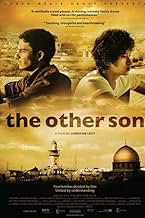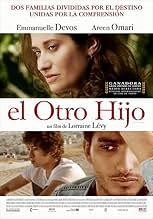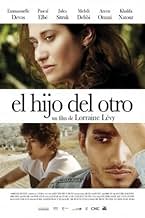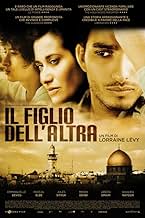IMDb RATING
7.3/10
3.9K
YOUR RATING
Two young men, one Israeli and one Palestinian, discover they were accidentally switched at birth.Two young men, one Israeli and one Palestinian, discover they were accidentally switched at birth.Two young men, one Israeli and one Palestinian, discover they were accidentally switched at birth.
- Director
- Writers
- Stars
- Awards
- 2 wins total
Mahmud Shalaby
- Bilal Al Bezaaz
- (as Mahmood Shalabi)
Tomer Offner
- Ilan
- (as Tomer Ofner)
Gilles Ben-David
- Le directeur de l'hôpital
- (as Jill Ben David)
- Director
- Writers
- All cast & crew
- Production, box office & more at IMDbPro
Featured reviews
"The Other Son" (2012 release from France/Israel; 105 min.) brings the story of 2 boys who are about to reach their 18th birthday. As the movie opens, we see Joseph applying to enlist at an elite unit of the Israeli Air Force, requiring him to do various medicals tests. It isn't long before his parents learn that Joseph's blood type (A+) is not compatible with theirs (A=). After some investigating, it becomes clear that two babies were switched accidentally at birth. The other 18 year old is Yacine, whose family lives in Palestine's West Bank. Joseph is devastated when he finds out about the mix-up at birth. But what about Yacine in Palestine? And how will their families react? And their friends? To tell you more would spoil your viewing experience, you'll just have to see for yourself how it all plays out.
Couple of comments: first, kudos to writer-director Lorraine Lévy for bringing us this movie. The plot is entirely believable, and Levy treats the subject matter with dignity and respect. As you can well imagine, this is a delicate topic and if not done properly, it will ruin the movie. When the impact of it all hits Joseph, he wonders "Am I still Jewish?". Even more importantly, this movie shows again that, when you put politics aside for a moment, at the end of the day we are dealing with real human beings. Watch how the Jewish and Palestine mothers deal with the news that the sons they have raised are not their own...
Bottom line: this movie should be required viewing for anyone interested in the Israeli-Palestine conflict. No, "The Other Son" is NOT a political movie, but instead is a heartbreaking family drama with a political undercurrent. "The Other Son" is HIGHLY RECOMMENDED!
Couple of comments: first, kudos to writer-director Lorraine Lévy for bringing us this movie. The plot is entirely believable, and Levy treats the subject matter with dignity and respect. As you can well imagine, this is a delicate topic and if not done properly, it will ruin the movie. When the impact of it all hits Joseph, he wonders "Am I still Jewish?". Even more importantly, this movie shows again that, when you put politics aside for a moment, at the end of the day we are dealing with real human beings. Watch how the Jewish and Palestine mothers deal with the news that the sons they have raised are not their own...
Bottom line: this movie should be required viewing for anyone interested in the Israeli-Palestine conflict. No, "The Other Son" is NOT a political movie, but instead is a heartbreaking family drama with a political undercurrent. "The Other Son" is HIGHLY RECOMMENDED!
I'm surprised that there are only two reviews - now three - of this movie on IMDb. It got a very good review when it played up in Cleveland, and since I couldn't make the trip up there to see it, I waited and rented it from Netflix. It was worth the wait.
The situation is straight out of an early Shakespeare comedy: two babies are switched at birth by mistake in a maternity ward, such that a Jewish Israeli family raises a young Arab and a Palestinian family raises a young Jewish Israeli. Just short of their 18th birthdays, they learn the truth.
The first part of the movie deals with the reactions of the four parents. All four actors give truly moving, first-rate performances. The Jewish father is an officer in the Israeli army, someone who has spent his life fighting Arabs. Still, he is torn apart by what he perceives as the loss of his son. The Arab father doesn't know how to react: is he now harboring a hated Israeli in his own poor home? But he, too, loves his son very much, and cannot deal with the thought of losing him.
The two mothers also experience a feeling of loss, but are able to speak to each other in ways that the two fathers, for political reasons, cannot.
The son of the Jewish couple finds acceptance in the Palestinian family through a mutual love of music. It is less clear how the son of the Arab couple will fit in the Jewish family. Will Yacine be able to tolerate living with an Israeli army officer? How will his family deal with that? The movie, as I said, is based on a clichéd theatrical device, but there is nothing clichéd about the acting or the script here: it all seems very real, and often very intense. It never seems fake. Unlike what the other two reviews suggest, not everything is resolved here by the end of the movie. That would have been too pat, too American-TV.
I strongly recommend this movie. It's really well done.
The situation is straight out of an early Shakespeare comedy: two babies are switched at birth by mistake in a maternity ward, such that a Jewish Israeli family raises a young Arab and a Palestinian family raises a young Jewish Israeli. Just short of their 18th birthdays, they learn the truth.
The first part of the movie deals with the reactions of the four parents. All four actors give truly moving, first-rate performances. The Jewish father is an officer in the Israeli army, someone who has spent his life fighting Arabs. Still, he is torn apart by what he perceives as the loss of his son. The Arab father doesn't know how to react: is he now harboring a hated Israeli in his own poor home? But he, too, loves his son very much, and cannot deal with the thought of losing him.
The two mothers also experience a feeling of loss, but are able to speak to each other in ways that the two fathers, for political reasons, cannot.
The son of the Jewish couple finds acceptance in the Palestinian family through a mutual love of music. It is less clear how the son of the Arab couple will fit in the Jewish family. Will Yacine be able to tolerate living with an Israeli army officer? How will his family deal with that? The movie, as I said, is based on a clichéd theatrical device, but there is nothing clichéd about the acting or the script here: it all seems very real, and often very intense. It never seems fake. Unlike what the other two reviews suggest, not everything is resolved here by the end of the movie. That would have been too pat, too American-TV.
I strongly recommend this movie. It's really well done.
Two teenage boys and their families, living on either side of the Israeli-Palestinian border, come to know that the boys were accidentally switched after their birth in a hospital. Such a situation set across such an enmity-filled landscape could very well be expected to escalate into chaos and violence, but thankfully, the uneasy situation and the extraordinary story is well handled, and without being melodramatic.
Lorraine Levy skilfully and essentially makes it a general human story, getting past its national and traditional boundaries. It tries to question identity in the face of change; genetics vs upbringing, religion, goals, where do we actually belong?, and what actually matters? The two teenage leading characters in the movie, Joseph and Yacine, deal with the situation and these questions with a certain level of maturity and sensibility, which comes from their background of education and non-inclination towards religious extremism. It also helps that the two sets of parents are intelligent and good-willed people who guide the boys to an informed and sensible transition. And that's where the beauty of the story lies.
The acting by the two leads, Jules Sitruk and Mehdi Dehbi, and the remaining cast is commendable, but it's Emmanuelle Devos, as Joseph's mother, who stands out from the rest. The scene in which the details of the birth-switching is disclosed to the two families is quite heart-rending. And the scene in which Joseph, in a moment of inspiration, starts singing an Arabic song in front of his birth-family to distract everyone from the awkward atmosphere, is quite delightful.
(A particular song used in the trailer as well as the movie, Yael Naim's 'My Dreams', is quite a beautiful and meaningful one)
Lorraine Levy skilfully and essentially makes it a general human story, getting past its national and traditional boundaries. It tries to question identity in the face of change; genetics vs upbringing, religion, goals, where do we actually belong?, and what actually matters? The two teenage leading characters in the movie, Joseph and Yacine, deal with the situation and these questions with a certain level of maturity and sensibility, which comes from their background of education and non-inclination towards religious extremism. It also helps that the two sets of parents are intelligent and good-willed people who guide the boys to an informed and sensible transition. And that's where the beauty of the story lies.
The acting by the two leads, Jules Sitruk and Mehdi Dehbi, and the remaining cast is commendable, but it's Emmanuelle Devos, as Joseph's mother, who stands out from the rest. The scene in which the details of the birth-switching is disclosed to the two families is quite heart-rending. And the scene in which Joseph, in a moment of inspiration, starts singing an Arabic song in front of his birth-family to distract everyone from the awkward atmosphere, is quite delightful.
(A particular song used in the trailer as well as the movie, Yael Naim's 'My Dreams', is quite a beautiful and meaningful one)
While the world continues to struggle to understand the constant schism between Palestine and Israel and yet permutations of that unsettled hot fire whose coals continue to smolder between aggressive flares, along comes a film such as this one - THE OTHER SON or Le fils de l'autre - and provides some insights that at least for the moment offer a better understanding of a very long struggle. Based on an idea by Noam Fitoussi who wrote the screenplay with Director Lorraine Lévy and Nathalie Saugeon, this is a gentle film about resolution of conflict - at least on the family level. It is a French production filmed in the West Bank and Israel under the sensitive direction of Lorraine Lévy.
It's not uncommon for those who rightly resent being biologically categorized on government questionnaires, to defiantly write in 'human' when asked to indicate their race. And the same holds true in its own compelling but curious way for the switched at birth DNA-driven identity crisis drama, The Other Son.
The relative stability of the two families in question - the Israeli Silbergs (Emmanuelle Devos and Pascal Elbéand) the Palestinian Al Bezaaz (Areen Omari, Khalifa Natourkin, and older son Mahmud Shalaby) in the West Bank - is shaken up when eighteen year old Joseph Silberg (Jules Sitruk) puts his musical aspirations on hold to report for mandatory military duty. But an army blood test confirms that he could not be the child of his parents, an odd stratagem, that a military on such permanent alert would be so thorough, especially since Joseph's father is a high ranking commander. But during a Gulf War missile attack near the Haifa hospital where Joseph was born, a Palestinian mother gave birth at the same time. And in the ensuing confusion, the babies must have been released to the wrong women. Joseph's distraught parents first waver, then seek out the Al Bezaaz family. And Yacine (Medhi Dehbi), their designated 'other son' in question, who has returned home for a visit from his medical school studies in France. While alternately fearful and hopeful mixed emotions become entangled, compounded by a profound cultural divide along with two fathers into deeply disapproving denial. Yet it is the coming together of the three 'brothers' that offers a ray of nope that in time this festering conundrum may be resolved.
The cast is splendid, especially Jules Sitruk and Medhi Dehbi whose humanity holds the story together. Highly recommended. In French, English, Arabic, and Hebrew with subtitles.
Grady Harp
It's not uncommon for those who rightly resent being biologically categorized on government questionnaires, to defiantly write in 'human' when asked to indicate their race. And the same holds true in its own compelling but curious way for the switched at birth DNA-driven identity crisis drama, The Other Son.
The relative stability of the two families in question - the Israeli Silbergs (Emmanuelle Devos and Pascal Elbéand) the Palestinian Al Bezaaz (Areen Omari, Khalifa Natourkin, and older son Mahmud Shalaby) in the West Bank - is shaken up when eighteen year old Joseph Silberg (Jules Sitruk) puts his musical aspirations on hold to report for mandatory military duty. But an army blood test confirms that he could not be the child of his parents, an odd stratagem, that a military on such permanent alert would be so thorough, especially since Joseph's father is a high ranking commander. But during a Gulf War missile attack near the Haifa hospital where Joseph was born, a Palestinian mother gave birth at the same time. And in the ensuing confusion, the babies must have been released to the wrong women. Joseph's distraught parents first waver, then seek out the Al Bezaaz family. And Yacine (Medhi Dehbi), their designated 'other son' in question, who has returned home for a visit from his medical school studies in France. While alternately fearful and hopeful mixed emotions become entangled, compounded by a profound cultural divide along with two fathers into deeply disapproving denial. Yet it is the coming together of the three 'brothers' that offers a ray of nope that in time this festering conundrum may be resolved.
The cast is splendid, especially Jules Sitruk and Medhi Dehbi whose humanity holds the story together. Highly recommended. In French, English, Arabic, and Hebrew with subtitles.
Grady Harp
There is the intense interplay between the pain of the sons and the pains of their parents simultaneously being explored with the back drop of the apartheid and mutual hatred caused by separation and discrimination. You can see this in verbal confrontation between the fathers, each with their own valid views, each honest men trying to do right by their families.
The transformation f both sons and the human connections on all levels would give hope for a peace but for the fact that in reality, the wall exists and there is only hardening of sides going on. The overall character and plot development of this movie is excellent. The lack of card board villains gives the movie a much more honest texture.
The transformation f both sons and the human connections on all levels would give hope for a peace but for the fact that in reality, the wall exists and there is only hardening of sides going on. The overall character and plot development of this movie is excellent. The lack of card board villains gives the movie a much more honest texture.
Did you know
- ConnectionsReferenced in Elle s'en va (2013)
- How long is The Other Son?Powered by Alexa
Details
Box office
- Gross US & Canada
- $1,285,918
- Opening weekend US & Canada
- $125,691
- Oct 28, 2012
- Gross worldwide
- $3,820,405
- Runtime
- 1h 45m(105 min)
- Color
- Sound mix
- Aspect ratio
- 2.35 : 1
Contribute to this page
Suggest an edit or add missing content



















